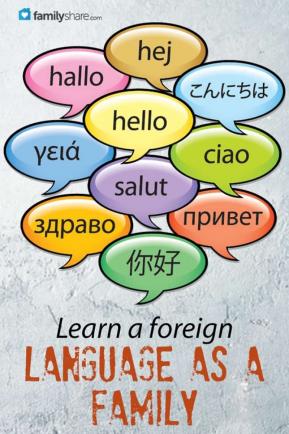
The advantages to speaking a second language are innumerable - new opportunities, increased language skills, and new doors opened to new friendships. Really, I can't even begin to tell you how helpful and fulfilling it is to learn another language. I won't claim to be fluent, but I absolutely love that I have learned to speak Spanish. It has blessed my life in many, many ways. And I've seen it happen for others, too.
Many people would like their children to have the experience of learning a new language. In today's multicultural world there are a lot of resources to make this goal a reality. Whether you speak a second language yourself or not, there are a number of things that you can do to help increase your child's exposure to a second language.
Make it a family effort
Language is one thing that simply can't be learned alone. Make an effort as a family to study, learn and use the language you are interested in. My toddler has learned a fair amount of ASL. I try to be there by his side learning it as well, otherwise I don't understand when he tries to sign to me. Learn and use phrases that you can repeatedly use each day.
Bilingual schools
In a number of school districts across the nation there are bilingual programs. Finding a program near you may take some scouting and include an admissions process. Spending several hours every day at school using the language to study regular curriculum is a great opportunity for your child and is certainly worth looking into. If a bilingual school is not an option, check your school for language classes or clubs. In elementary school my sister and I attended an early morning Spanish class that really helped to set a foundation of the Spanish language for me.
Encourage friendships with families who speak a different language
It's likely that your kids have friends who speak another language at home. Take advantage of that resource. Invite the family over and encourage your child to listen and try to communicate as best they can in real, everyday conversations with them.
Read books
Check out books from your local library or order books online. Some will have both the English and the foreign translation listed. If not, keep a dictionary handy and pause when you or your child don't know the meaning of a word. I like to write the translation in the margin of books we own so that I see it each time we read that book.
Watch movies or TV in a foreign language
Many movies come with the option to watch with sound or subtitles in a foreign language. I prefer to change the audio to the foreign language with English subtitles. Kids' shows are especially easy as they are repetitive and use simple vocabulary. If your kids are going to watch TV, have it double as a foreign language lesson.
Learn songs or nursery rhymes in another language
The Internet (especially YouTube) is a great resource for finding songs or nursery rhymes that you can learn and memorize together.
Notice languages in the world around you
It's easy to only see the English when it's most common. Take a moment to pause and listen to other sounds and words of other languages. Both written and spoken, foreign words can be found everywhere including public signs, food packaging and instruction manuals, just to name a few. See just how many places you can find it!
Learning a language is a great experience. Keep it fun and applicable and study the culture behind the language. Buena Suerte!

